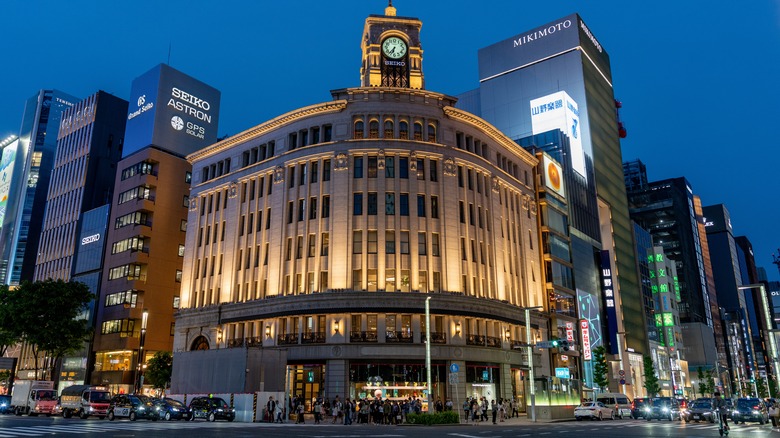The One Etiquette Rule You Should Never Break When Visiting Japan (And Tourists Often Get It Wrong)
A quick Google search reveals that Japan's culture is rich in tradition, which can lead to social faux pas for unsuspecting travelers. For some, the nation may seem a veritable minefield of violations that any visitor would loathe to commit. It's widely known, for example, that you should keep your voice down while riding public transportation or else suffer a side-eye or two from your fellow commuters. Eating while walking down the street is another social violation that may earn you an eye roll, and it's important to look out for these subtle cues of annoyance. Expressions of anger in Japan can range from non-verbal to pretending that nothing is wrong at all.
While it may seem difficult to remember the proper protocol for every situation in the etiquette-rich nation, one thing you should make sure to do is be on time. Punctuality is perhaps the number one thing that demonstrates respect for others in a social situation, and what makes it great is how easy it is to accomplish. Now, there are nuances to this unspoken rule in Japan (of course), but one thing to know is that late is late — even by one minute.
With more than 40 million people projected to visit Japan by the end of 2025, some Japanese citizens have started to become overwhelmed by the recent influx of tourists. A geisha sightseeing hub in Kyoto even had to ban tourists from walking there, due to overzealous picture-taking and other invasive behavior. It also doesn't help when tourists break easy-to-follow rules, such as not littering or avoiding wearing strong-smelling perfumes in public. So to ease tensions, especially when fulfilling bookings like reservations with restaurants, show respect to those you have made obligations to, and be on time.
Being punctual in Japan is about respect
Arriving on time for restaurant reservations is as much for you as it is for the proprietors, as being late could lead to shortened dining time and missing crucial steps in the eating experience. On the venue's end, higher-end establishments may start preparing your meal at a specific time depending on your agreed-upon arrival. So, in the event that you can't make it on time —or at all— it's best to notify them well in advance. Twenty-four hours' notice is sufficient, and to further avoid ruffling feathers, apologize profusely if you do happen to arrive late.
Plot twist, though: being late isn't the only way you can fall short of being punctual in Japan. In a surprising statement issued by the Tsukuba Express line in Tokyo, the railway company apologized after one of its trains departed 20 seconds early. This may seem like an excessive reaction to some, but being on time in Japan is as much about efficiency as respecting others. This is good to keep in mind in the event you are invited to a party, as being too early could distress the event organizers by putting pressure on them to begin before they are ready. For parties, the sweet spot is 10 minutes before the start time, and if you really want to show off your Japanese knowledge, come with a small gift in hand.

